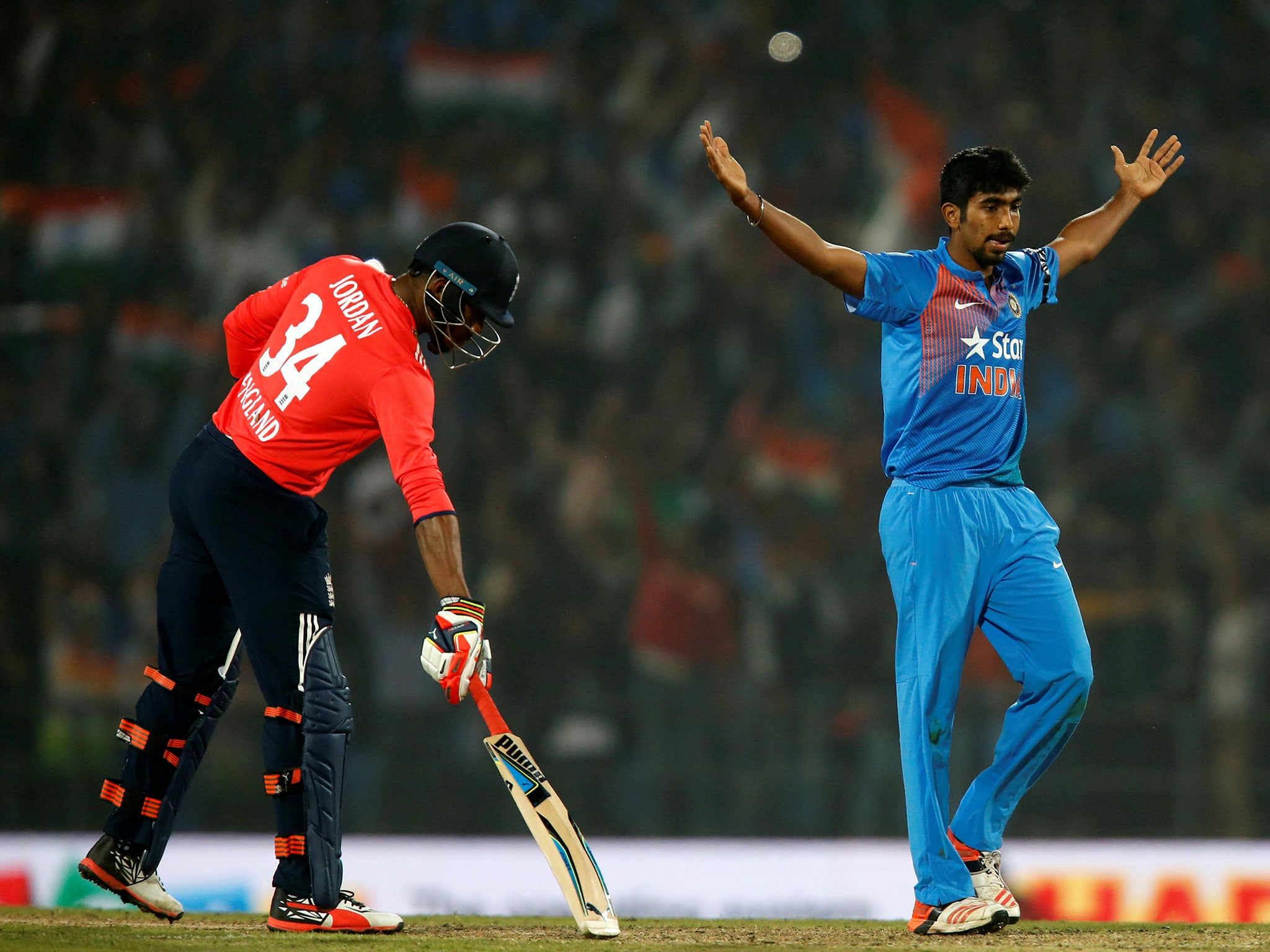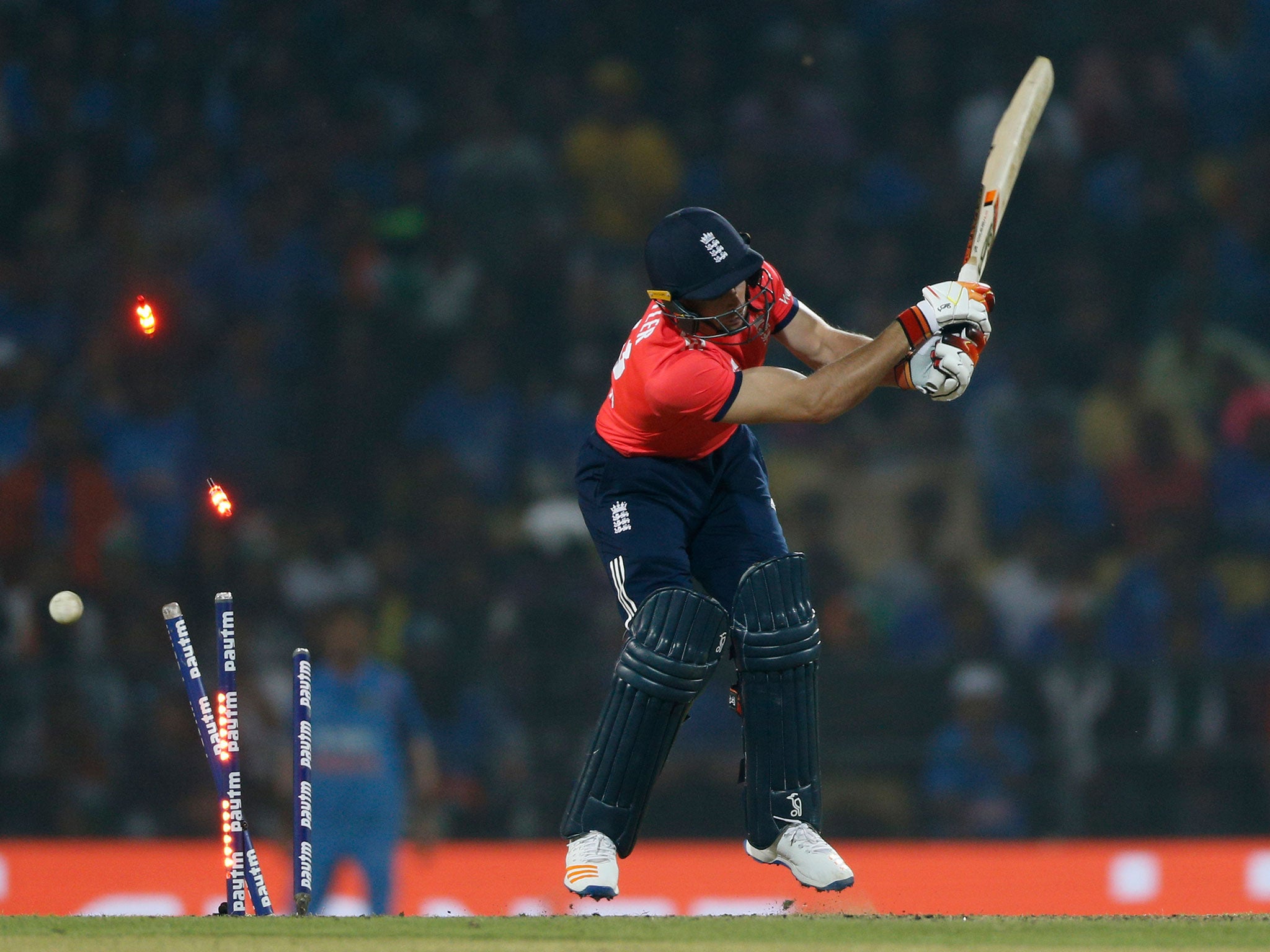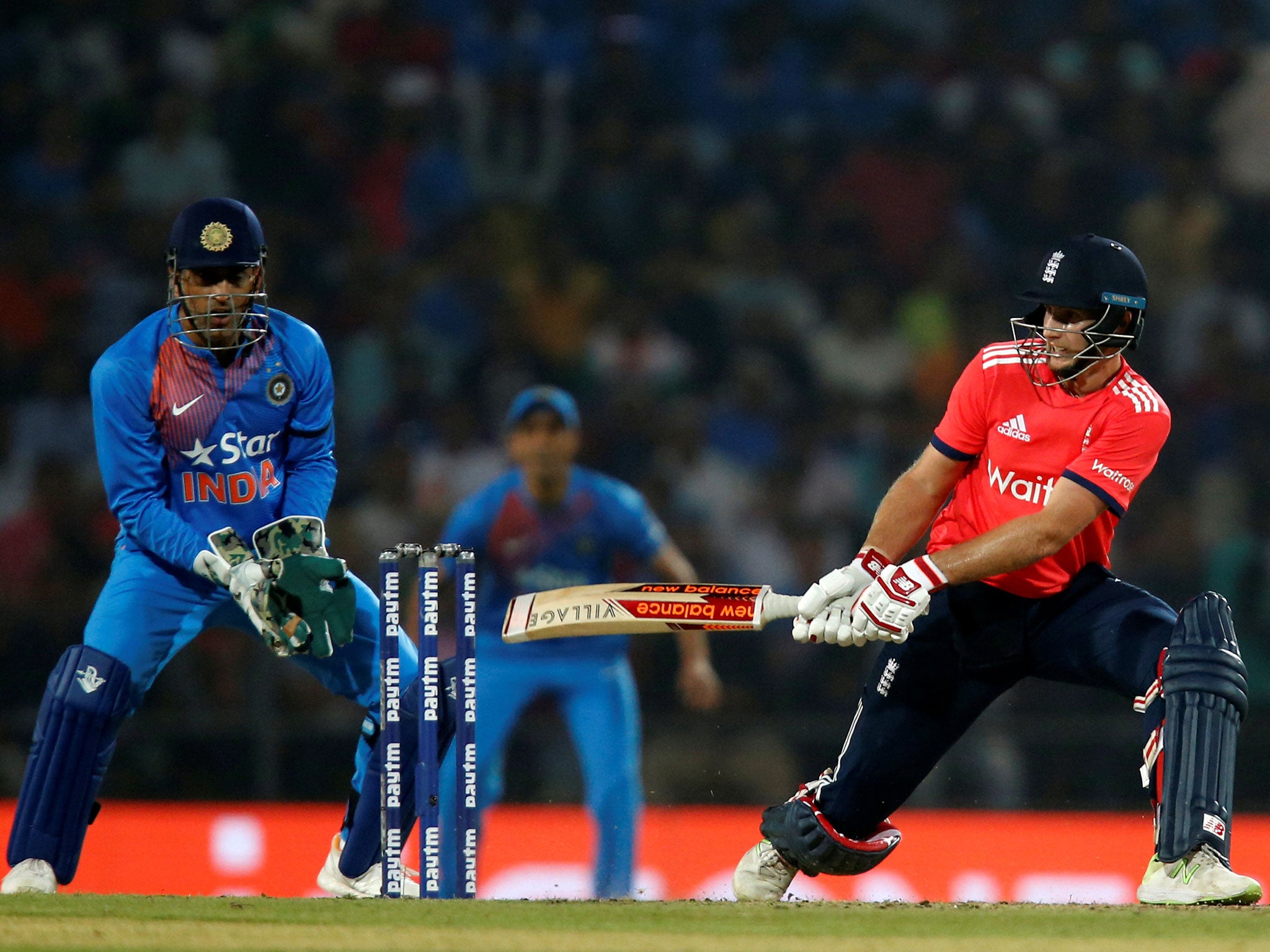Jasprit Bumrah denies England at the death as India level Twenty20 series
A combination of brilliant death bowling and risible umpiring saw India claim victory over England and set up a winner-takes-all clash in Bangalore

On a sultry evening in Nagpur, England were unable to overcome a cacophonous crowd, ropey umpiring and subtle, precise death bowling.
After yielding only three runs from the 18th over, flummoxing Joe Root with a series of slower balls, Jasprit Bumrah was left needing to defend eight from the final six balls. The first deceived Root, erroneously dismissed lbw after an inside edge, and the over played out with a mesmerising finale, each delivery greeted with ever-more pandemonium at the VCA Stadium. As Moeen Ali heaved in vain at the final ball, a yorker outside offstump, Bumrah held his arms aloft and looked to the sky, toasting a remarkable over that had yielded only two runs.
Twenty20 cricket is a game designed with big-hitting in mind; stifling it is the most precious attribute of all. Here Bumrah did that superbly, delivering his box of tricks with such chutzpah that it left players of the calibre of Root and Jos Buttler left heaving more in hope than expectation.
Bumrah’s skill was to ascertain what would be most effective on the wicket: essentially, a combination of back-of-a-length deliveries mixed with slower balls outside offstump, including three consecutive ones to Root to end the 18th over, ultimately the decisive juncture in the game. With England needing only 32 from their last four overs with seven wickets in hand, Ashish Nehra was almost as impressive, deceiving Ben Stokes with a slower ball of his own.

For all the wiles of India’s fast bowling pair, England could be entitled to feel aggrieved. India’s victory was abetted by a couple of umpiring errors - the incorrect decision against Root, and a reprieve of Virat Kohli, plumb lbw seven runs into his 21 - which were enough to raise the question: if neutral umpires are demanded for all Test matches, why not for T20Is, too, when two home umpires are still permitted? England, Morgan said, felt “extreme frustration”, and supported the introduction of the Decision Review System in T20Is. “There is as much on the line as there is in a Test or a one-day match so no reason why it shouldn't be used.”
England intend to issue a formal complaint to the match referee about the umpiring, and Paul Farbrace’s words to local umpire Chettithody Shamshuddin - who is down to officiate in the series decided in Bangalore - in the moments after the game appeared to reflect England’s angst.
Yet England would also not reflect on their batting with any great fondness. Chasing 145 on a tricky pitch demanded a refined approach, not merely the brutal swinging that now defines England in limited overs cricket.

A series of dismissals - Billings top-edging Nehra after advancing down the pitch; Roy being caught off a leading edge; the very next ball; and Eoin Morgan tamely picking out midwicket when England seemed ascendant - were distinctly of the self-inflicted variety. And this was an innings marked by a little too much swinging for the hills: England failed to score from 42 balls, while India failed to score from 36 balls, a difference one run more than India’s margin of victory.
So, despite some Stokes thrashing a pair of thunderous straight sixes after being bowled off a no ball first delivery, and Root anchoring the innings, the night ended with 40,000 lauding a classic finish and their desired result. In the context of the match, KL Rahul’s 71 was a classic of the genre, combining shrewd recognition that the conditions demanded less gung-ho than usual with crisp driving on both sides of the wicket.

How India needed him: they only managed four other boundaries in the whole innings. None of England’s attack was more impressive than Chris Jordan, who troubled Virat Kohli more than any other Englishman either side of Christmas. In Jordan’s opening over, the third of the innings, Kohli was struck on the pad by a ball that kept low, but was somehow reprieved. Two overs later, Jordan’s 64mph was bunted, mostly ungainly by Kohli’s regal standards, to long on.
Jordan’s was a performance that married control with variation - eight of his 24 deliveries were slower balls, according to the analytics company CricViz, and he also varied his line and length shrewdly. In a magnificent final over, Jordan conceded only five while taking two wickets, including MS Dhoni inside-edging a heave onto his stumps, hopelessly early on a slower ball.
There was also a run-out: Hardik Pandya drilled a ball straight into the stumps, uprooting the bails, but Jordan reacted with clarity and nonchalant athleticism to gather the ball and uprooted the stump. For England, the only shame was that Jordan provided Bumrah and Nehra with the perfect template of how to bowl on this wicket, but Jordan’s two terrific showings this series have given him strong hopes of returning for a second stint in the IPL, especially as his estrangement from England’s ODI squad means that should be available for the whole season.

It seems unlikely that Moeen Ali will even be in the IPL auction on February 21 - and, in truth, few franchises would be wooed by his offspin, given the abundance of Indian players capable of matching it.
Yet Moeen has been the most frugal bowler on either side this series, here recording his cheapest four-over spell in a T20I for the 2nd game in a row, and taking his series figures to 8-0-41-3. If this was a performance lacking any great mystery, it was a triumph for superb control: Moeen did not yield a single boundary. Sensing his threat, Morgan gave him a slip against Yuvraj Singh, who should earlier have been given lbw by Shamshuddin but was eventually dismissed sweeping after a torturous four from 12 balls.
That one-sided tussle embodied how, after a series of limited overs games in which bowlers have often seemed a mere addendum to the batsmen who shape matches, here bowlers had a wicket that empowered rather than neutered them. The spin bowlers could generate turn, and the pace bowlers could garner bounce. It made for absorbing cricket and a thrilling denouement, each England dot ball cheered as jubilantly as the winner in an FA Cup tie.
Join our commenting forum
Join thought-provoking conversations, follow other Independent readers and see their replies
Comments
Bookmark popover
Removed from bookmarks